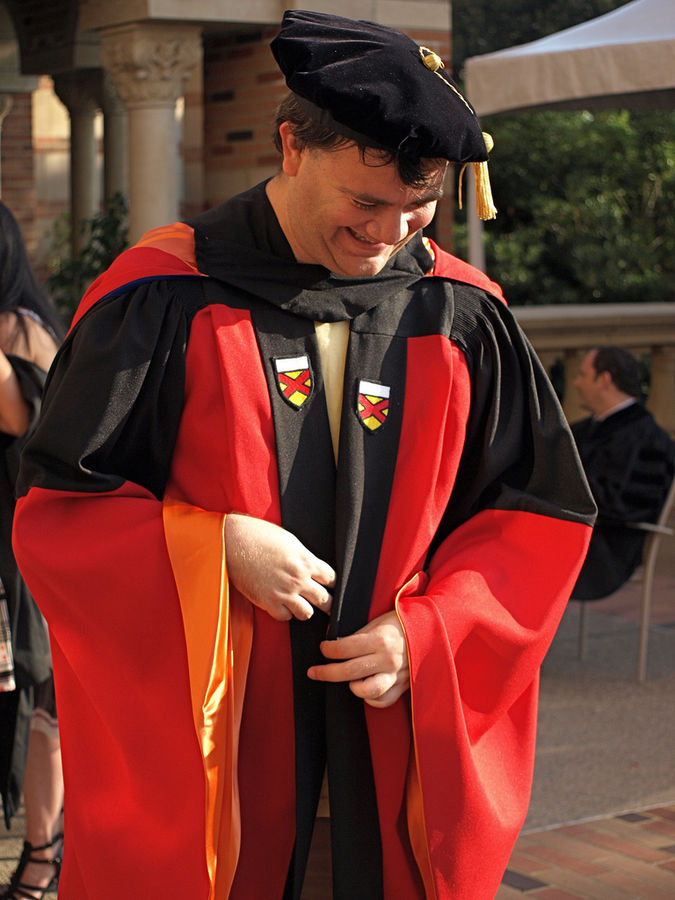Tag Archives: Education
So, You Want to Become a Special Education Teacher?
Special education teachers work with special needs students who must have their lessons tailored to them on account of physical or intellectual disabilities, learning disabilities, or mental health issues. Some special needs educators have a classroom of their own, while others co-teach in an inclusive setting where special needs students are integrated with other students their own age.
If you’re interested in special needs education, you’ll need to develop a specific set of skills through education, and obtain state licensure. However, education and skills alone can’t make a great special education teacher. You’ll also need to possess a genuine love of children and a set of other crucial personality traits, including patience, creativity, optimism, a good sense of humor, and strong organization skills.
Education and Licensure Requirements for Special Ed Teachers
At a minimum, you’ll need a bachelor’s degree in order to teach special needs students. However, many states require special education teachers to have a master’s degree. You can earn your bachelor’s degree in an academic subject or elementary education, with a special education minor, or you can go ahead and major in special education. If you major in special education, you can use your master’s program as an opportunity to specialize in a specific field of special education, but otherwise, your master’s program should focus on the basics of special education so you can obtain licensure. You can even earn your MS in Special Education online while working as a teacher, allowing you to earn teaching experience at the same time.
Once you have your degree, you’ll need to obtain special education teaching licensure. The requirements for teaching certification and licensure vary from state to state. Look up the requirements in your state so you know what to expect.
Personality Traits You’ll Need to Succeed
On top of an advanced degree, in order to make it as a special education teacher, you’ll have to really, genuinely like children. Real children, especially those with special needs, may act out when they feel upset or overwhelmed. They may not always be as polite as you’d like, because they haven’t learned this skill yet. They may be messy, and may even struggle with hygiene issues. Special needs children especially require a non-judgmental teacher who can accept them as they are.
You’ll need to be very intelligent to make it as a special education teacher, since you’ll have to adapt your lessons to fit the needs of each individual student. That means you’ll need to closely observe your students and do a lot of thinking about their strengths and weaknesses, their learning style, and how you can make lessons most accessible to them.
Other strengths you’ll need include strong organizational skills, not only so you can provide the students with the structure they need, but also so you can stay on top of federal and state guidelines and meet any deadlines that may arise. An even temperament and a good sense of humor will help you make lessons fun for your students, who will enjoy class much more if they can sense that you’re enjoying their company.
Creativity will help you find novel ways to present information so that special needs students can understand it. Patients will help you weather those moments when special needs teaching inevitably becomes frustrating. Optimism can help you remain hopeful and encouraging when students struggle to master subjects or lessons, as they almost certainly will.
Job Outlook for Special Needs Teachers
While the need for talented special needs teachers is great, the Bureau of Labor Statistics doesn’t predict as much growth for this field in the next 10 years as it does for some others. Special needs education is expected to grow by about six percent over the next decade. So, while there are special needs jobs out there, you’ll need to keep in mind that the field is very competitive. Do everything you can while in school to improve your chances of landing a job. Speak with career counselors, network as much as you can, practice interviewing techniques, make sure your social media presence is squeaky clean, and polish your resume until it shines.
Special needs teachers need a specialized education that can help them make lessons accessible to their students, and they need a specific set of personality traits in order to succeed in the field. If you think you have what it takes to be a great special education teacher, don’t hesitate to start on the path to special needs teaching today. The field needs more educators like you.
How to transition out of academia (and why) once you get your Ph.D.
Traditionally, the Ph.D. is intended to prepare students for a career in academia. Most Ph.D. students hope to obtain a prestigious post-doctoral fellowship, followed by a tenure-track professorship, upon graduation. But The Chronicle of Higher Education reports that 76 percent of the academic labor force consists of adjunct professors who can’t qualify for tenure and make about $2,700 per course.
However, that doesn’t mean you shouldn’t earn a PhD. Earning a doctorate gives you critical thinking skills, teaches you how to collaborate, and bestows a level of expertise in your field that employers place a premium on. A Ph.D. can still lead to a lucrative career path, as long as you look for opportunities outside of academia upon graduation. You just have to learn how to market yourself, and you may want to seek advice from other Ph.D.-holders who have successfully navigated the transition out of academia.
Decide What You Have to Offer Non-Academic Employers
The smoothest career transitions out of academia belong to those who hold Ph.D.s in STEM fields — industry has long valued experts in science, mathematics, technology, and engineering. But you don’t have to hold a STEM Ph.D. in order to have a lot to offer a company. Ph.D.s in all fields impart some of the following qualities:
- Strong communication skills
- The ability to express complex ideas in a way that is easy to understand
- Creativity
- Problem-solving skills
- Self-direction
Translate the academic skills you learned while doing your Ph.D. into marketable job skills. You may have little industry experience, but if a company wants two or three years of experience, you can argue that work you did in the course of earning your doctorate required some or all of the skills needed for the job. Be specific about which of your skills meet the company’s job requirements. Customize your CV and cover letter to each position.
Allay Recruiters’ Fears About Candidates With Ph.D.s
Companies often fear that Ph.D.-holders will be too introverted, won’t be able to communicate with “regular” people, or will get bored with an industry job if they don’t feel intellectually stimulated. Let recruiters and interviewers know that you’re personable and down-to-earth, with great communication and people skills. An industry job can be just as intellectually stimulating as degree work or an academic position; make sure you can convey a genuine excitement about the job for which you’re applying. Point out that, in many Ph.D. fields, you need to be a team player in order to complete research or teach classes.
When you do a Ph.D., you’re essentially seeing a long and challenging project through to completion — play up that fact in interviews. Make clear that while you’re capable of working well with others, you’re also capable of working independently without a lot of supervision. Draw attention to your sense of accountability and remember, just because you have a Ph.D., you’re not inherently smarter than any of your future colleagues. Don’t act as if you’re owed a position.
Talk to Others Who Have Left Academia
You’ll have an easier time transitioning into an industry position if you complete a Ph.D. that prepares you for work in industry, especially one with strong, expected growth. But if you already have a Ph.D. in French, Russian literature, history, or some other field that appears to have a solely academic focus, don’t worry. You can translate any Ph.D. into a well-paid job.
Start by joining a professional organization for Ph.D.-holders who want to work outside of academia, such as Versatile Ph.D. Versatile Ph.D. sponsors nationwide networking events and more casual meet-ups for Ph.D.s who have, or want to, pursue careers outside of the Ivory Tower. You can discover more about your career options, find job listings on the group’s website, and get advice from other Ph.D.-holders about how to find jobs outside of academia. Registration is free, and members of one of the site’s many subscribing institutions can access premium content designed to help them find jobs.
Though the Ph.D. is traditionally meant to prepare students for a career in academia, the skills it teaches can be useful across a range of industries. Don’t feel that your Ph.D. limits you to teaching at the university level. In fact, it can open doors to lucrative, stimulating, and fulfilling careers in all kinds of industries, no matter what your field of study.
Best Tech Startups for Education in 2015
Edu-tech
According to custom USA essay writers, education technology has emerged to ease the pressure in the classrooms and well as to equip learners with the necessary skills for the good of the society. As a result, the education has devoted its resources in creating a suitable environment that suits the growth and development of learners. Budgetary team pays a keen eye on funding learning institutions in order to propel technological advancement as well as to meet the increasing demand for the students across the world. Based on the above agendas, how are the current trends in the tech start-up?
Online Studies
According to International Academia Research Group, e-learning is increasing at the rate of 13% annually. This proliferation means that business organizations and learning institutions will allocate more than $210 billion in the technology line by 2018. E-learning is flexible since potential students can pursue their degree of choice from the comfort of their homes. This learning model helps the learners to customize their devices and access most of the learning materials.
Skills Acquisition
Tech start-ups create a competitive learning model where the participants demonstrate their know-how towards working with different devices. If this knowledge utilized in an organization, numerous benefits will occur. Simulation, modeling and interchanges among students, are critical under start-ups since new ideas develop. Online educations will help students gain skills that match what a company requires.
Flip Learning
Tutors stream videos through particular links that students utilize in order to upload video whether at home or school. Then, lecturers consolidate the students in classrooms to brief them on the coverage of the video. This learning model helps in optimizing students’ interactivity. With the current trend, education will continue being enjoyable and beneficial to the society.
How To Save Money For A Master Of Urban Planning
Paying for graduate study is hard, and even with a qualification as prized as a Master of Urban Planning, few will want to graduate and begin their working lives in (even deeper) piles of debt. A master of urban planning degree is crucial to one’s success because it will enable practitioners to develop the necessary skills for balance, community development, social justice, and so much more. Here, we offer some tips on saving cash to pay for your all-important study.
Clear Out Your Closet
It’s highly likely that you will have a lot of unused possessions laying around at home. With an estimated 85% of women owning clothes they never wear (and a high percentage of men too, no doubt), now’s the time to convert them into cash. Be ruthless- unless something has sentimental value, if you don’t use it, you can sell it. Do your research- sell valuable items and branded clothes on eBay, and cheaper things at having a yard sale- you’ll be amazed at how many people will be prepared to pay for old crockery, opened nail polishes, and used books. And whatever you don’t sell, donate!
Work At A Bar
Going out is expensive. Instead of spending your money on beer, get a part-time job in a bar instead. You will still have the opportunity to socialise and meet new people, and you can put your tips straight into your savings. Plus, bar staff often get free drinks after their shift- it’s a winner all round.
Become A Freelancer
Working for yourself is exceptionally satisfying- there’s no office you have to sit in, and no boss you have to answer to. Take a close look at your skills. Are you a whizz in graphic design? A Photoshop Queen (or King)? Can you write well? There is a selection of legitimate freelancing sites online where you can monetise these skills. You won’t get rich, but some decent money can be made, and best of all, you can fit it around your schedule, and continue completing your briefs when you begin your studies too.
By planning carefully, you can save money to pay for your Master of Urban Planning degree. Try to avoid unnecessary purchases, and if you really do need to buy something, check if it can be found cheaper elsewhere. With some discipline, you can stretch your money further.
What are the Requirements for a Phlebotomy Certification?
A phlebotomist is a professional specifically trained in the skill of drawing blood through venipuncture and preparing and storing samples in a safe and clean environment. It is one of the fastest growing jobs and promises quick ascension with a little further education for ambitious individuals. However, in order to begin your career as a phlebotomist, there are certain requirements you need to fulfill to secure a phlebotomy certification.
Primary Education
You would need at least a high school diploma or an equivalent such as a GED to be able to enroll in a training program for Phlebotomy. Taking courses in physiology, biology, math and the sciences will also help. The school or hospital you apply at might also run a background check on you and would require you to have current immunization.
Further Education
You can then enroll in a Phlebotomy program, which needs to last for at least 6 – 10 weeks. This will earn you a certificate, which is the minimum requirement to begin your career. However, you can also opt for an Associate’s Degree or a Bachelor’s Degree, which provides more fine tuned skills and knowledge and will earn you better and higher paying jobs, maybe even at supervisory levels. However, all these programs need to be accredited by the National Accrediting Agency for Clinical Laboratory Sciences (NAACLS).
Classes and Courses
Your courses and classes in a basic Phlebotomy program consists of anatomy and physiology, which teach you the skills of extracting blood, and prepare you for potential complications. You will also learn to operate, adjust, put together, and maintain lab equipment. In addition to this you will be introduced to relevant medical chemistry, pathologies, anatomy, medical terminologies, healthcare law and even psychology and interpersonal communication to better deal with anxious patients.
Practical training and experience is a huge part of the training, and is carried out at special training sites under professional supervision. For this reason you do not need job experience when you apply for a phlebotomist position.
Certification Requirements
There is no exam that needs to be taken for certification, but instead each state has its own requirements for certification. On average you will need to have about 42 hours of classroom training and 120 hours of clinical experience. Some states even specify the number of venipunctures and other phlebotomy procedures that need to be completed in order to be certified.











